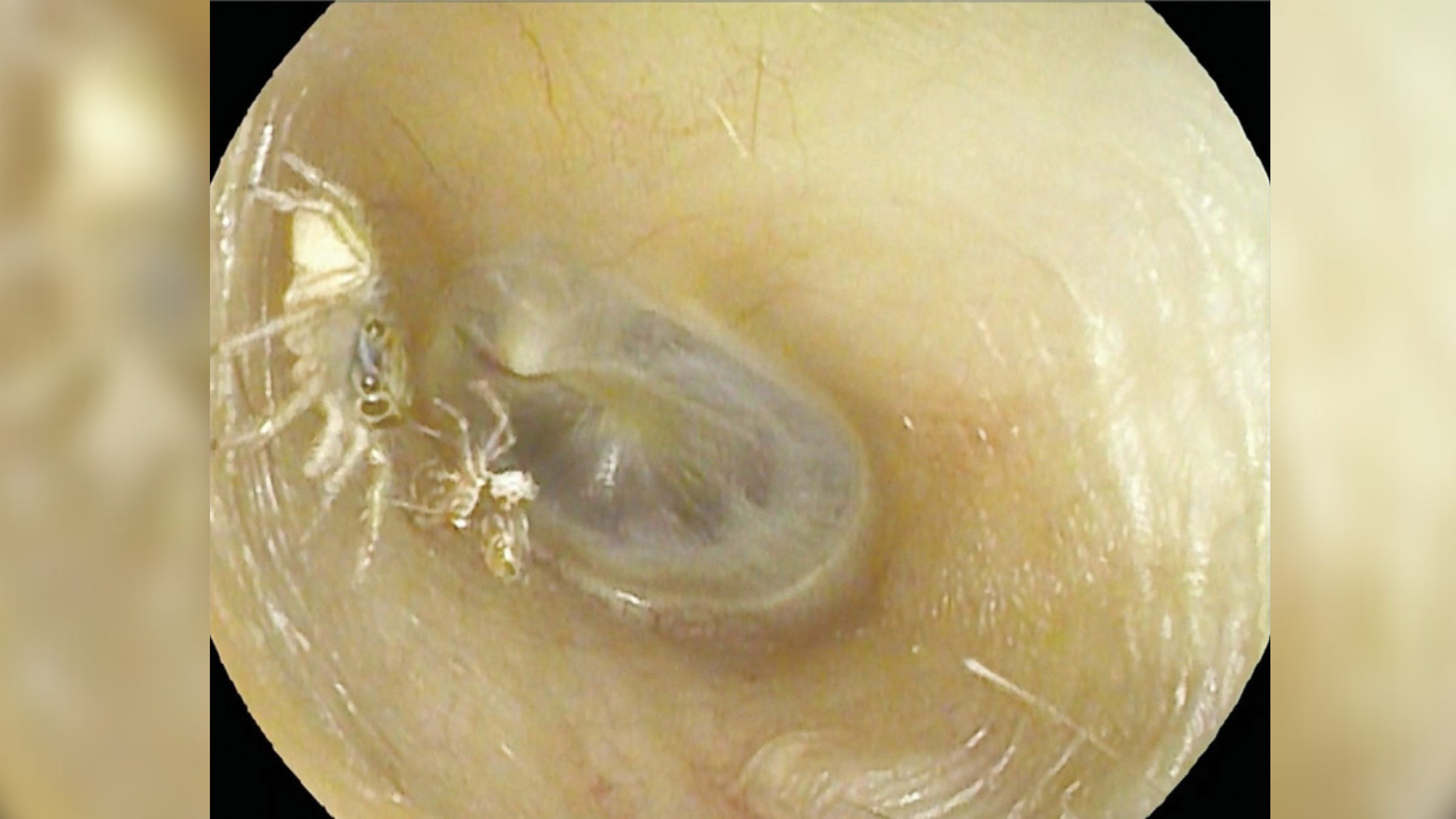Horrifying video reveals molting spider rustling in woman's ear
The spider in the woman's ear was making continuous, weird clicking and rustling noises that were so bad, she couldn't sleep.
Scared of spiders? You might want to look away now.
In a bizarre medical case, a woman in Taiwan got a nasty shock when doctors discovered a spider about 0.1 inch (0.25 centimeters) long crawling in her left ear canal. At first glance, it looks like there are two spiders scuttling around in there, but the second arachnid is actually just the spider's molted hard outer shell, or exoskeleton.
The 64-year-old woman had visited an ear, nose and throat clinic at the Tainan Municipal Hospital in Taiwan after spending four days hearing weird sounds in her left ear.
The day her symptoms started, she was woken up to a strange feeling that a creature was moving inside her ear. She then began to hear incessant beating, clicking and rustling sounds that were so bad, she struggled to sleep.
Related: A man heard 'scratching' noises in his ear. It was a spider.
A woman with hypertension presented to the clinic with a 4-day history of abnormal sounds in her ear. On examination, a small spider was seen moving within the external auditory canal of the left ear. The molted exoskeleton of the spider was also present. https://t.co/dye2sbbiL9 pic.twitter.com/SfeNBBGQS8October 25, 2023
At the hospital, doctors discovered that a small spider with bulging, brown eyes was moving within the ear's external auditory canal, the passageway that links the outside of the ear to the eardrum. They also saw that the spider had molted its ghostly white exoskeleton — something that spiders normally do when they grow so that it can be replaced with a new one.
"She didn't feel pain because the spider was very small. It's just about 2 to 3 millimeters [0.07 to 0.12 inch]," Dr. Tengchin Wang, co-author of the report and director of the otolaryngology department at Tainan Municipal Hospital, told NBC News.
Get the world’s most fascinating discoveries delivered straight to your inbox.
The case report, published Oct. 21 in The New England Journal of Medicine, didn't note the species of spider or how the critter might have gotten into the woman's ear. Although these instances are rare, there have been documented cases of spiders crawling into people's ears, and it happens with insects, too: Live insects account for about 14% to 18% of cases of the foreign objects that doctors find in the external auditory canal. This is likely because the area is warm and dark, so it provides a welcoming space for these critters.
Dr. David Kasle, an otolaryngologist at ENT Sinus and Allergy of South Florida who was not involved in the woman's case, told NBC News that the average ear, nose and throat specialist will see "tens, if not more, of bugs or some sort of arthropod" in ear canals throughout their career. However, he said this particular case was "unusual and disturbing."
Wang had seen insects — such as ants, moths and cockroaches — in people's ears before, but he'd never come across a spider that had shed its exoskeleton inside a person's ear canal, NBC News reported.
Wang and his team successfully removed the spider and its exoskeleton from the woman's ear by sucking it out with a thin tube, called a cannula, placed through an otoscope, a tool doctors use to look into the ear. The woman's symptoms vanished after the arachnid was removed. For bigger spiders or insects, a local anesthetic should be used to kill the critter before it's removed to "prevent excessive movements and subsequent damage to the structures of the ear," the case report authors wrote.
However, liquids should never be used if the eardrum has been pierced and has holes in it, the authors cautioned; this wasn't the case for women in Taiwan. Wang told NBC News that, to be on the safe side, anyone who experiences any of these symptoms should see a doctor even if they think the bug or spider has exited their ear, just in case an antenna or exoskeleton got left behind.
This article is for informational purposes only and is not meant to offer medical advice.
Ever wonder why some people build muscle more easily than others or why freckles come out in the sun? Send us your questions about how the human body works to community@livescience.com with the subject line "Health Desk Q," and you may see your question answered on the website!

Emily is a health news writer based in London, United Kingdom. She holds a bachelor's degree in biology from Durham University and a master's degree in clinical and therapeutic neuroscience from Oxford University. She has worked in science communication, medical writing and as a local news reporter while undertaking NCTJ journalism training with News Associates. In 2018, she was named one of MHP Communications' 30 journalists to watch under 30.



